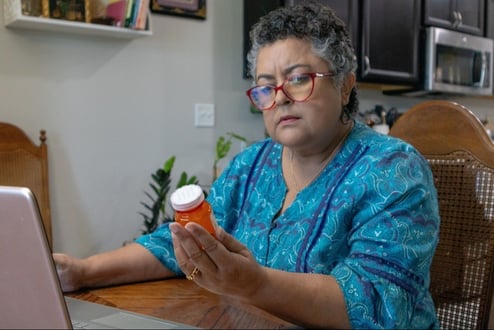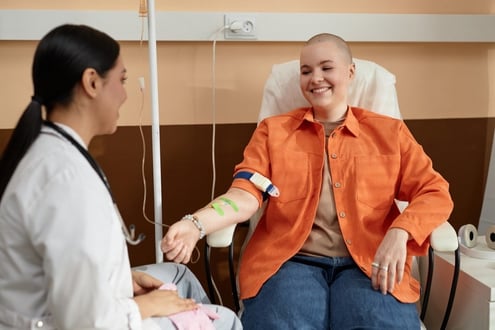Breast Cancer: Targeted and Immunotherapies
Targeted and Immunotherapies for Breast Cancer
This section covers the following topics:
What is ?
is a type of cancer treatment designed to attack or kill cancer cells, while sparing normal cells as much as possible. They are designed to target abnormal proteins, receptors or genes that are found in cancer cells or the surrounding tissue.
PARP inhibitors
PARP inhibitors are a type of that works by blocking a protein that the body uses to repair damage. They were initially developed to treat cancers in people with an inherited or mutation.
- For breast cancer, two PARP inhibitors have received FDA-approval as for treating people with an inherited mutation:
- Lynparza ()
- ()
- For people with early breast cancer at high risk for recurrence:
- Lynparza may be used as treatment after chemotherapy in people with an inherited or mutation. Lynparza is approved for patients with high-risk, early breast cancer and an inherited or mutation.
Researchers are studying new ways to use PARP inhibitors to treat breast cancer, including:
- for people with an in a different gene that repairs damage (for example: , or ).
- for people who do not have an inherited gene mutation, but their tumor tested positive for an acquired mutation in a gene that repairs damage.
Visit our Featured Research section for more information.
Other targeted therapies
Targeted therapies are often given to people based on specific changes in their cancer cells. Tumor testing can help doctors identify the patients most likely to benefit from a . Common targeted therapies used in breast cancer include:
Triple-negative breast cancers
- , that has progressed may be treated with the drug Trodelvy (sacituzumab govitecan).
or HER2-low breast cancers
- breast cancers of all stages are often treated with drugs that target the protein. Common anti-HER2 therapies include Herceptin (trastuzumab), Perjeta (pertuzumab) and Tukysa (tucatinib), Phesgo (pertuzumab, trastuzumab and hyaluronidase) and Enhertu (T-DXd).
- or advanced HER2-low breast cancers may be treated with the anti-HER2 drug Enhertu.
Hormone receptor-positive breast cancers
- advanced breast cancers are often treated with CDK4/6 inhibitors. CDK4/6 inhibitors target proteins found in some breast cancers called CDK inhibitors. The three CDK4/6 inhibitors approved for use in breast cancer are: Ibrance (palbociclib), Kisqali (ribociclib) and Verzenio (abemaciclib).
- breast cancers that test positive for a tumor called PIK3CA may be treated with the drug Piqray (alpelisib). PIK3CA is an acquired gene mutation found in some ER-positive breast cancers.
- The drug Truqap (capivasertib) combined with fulvestrant is approved to treat , advanced or breast cancer with a mutation in , PIK3 or AKT1 genes which recurred or got worse after standard hormone therapy.
In the News
What is ?
Immunotherapies are cancer treatments that help the body’s immune system detect and attack cancer cells. Immune checkpoint inhibitors are a type of used to treat several types of cancer, including breast cancer. Some cancer cells can switch off the immune system. Immune checkpoint inhibitors are drugs that prevent this from happening. This allows the immune system to find, unmask and destroy cancer cells. Immune checkpoint inhibitors are approved for treating breast cancer in the following situations:
- Keytruda (pembrolizumab) is approved in combination with chemotherapy for treatment of that is or locally recurrent and unresectable that tests positive for a called .
- Keytruda is approved for the treatment of triple-negative breast cancer that is at high risk for recurrence. In this setting, Keytruda is used along with chemotherapy as therapy before surgery. Following surgery, Keytruda is continued alone.
|
Name of Drug |
Cancer |
Indication |
|
Type of Agent |
|
Herceptin |
Early |
The treatment of breast cancer |
overexpression () |
Antibody targeting receptors |
|
Perjeta (pertuzumab) |
Locally advanced, inflammatory or early |
Combined with Herceptin (trastuzumab) and docetaxel as treatment before surgery () |
overexpression () |
Antibody targeting receptors |
|
Phesgo (pertuzumab, trastuzumab combined injection) |
Early |
|
overexpression () |
Antibody targeting receptors |
|
Keytruda (pembrolizumab) |
Early TNBC at high risk for recurrence |
Before surgery Keytruda is used along with chemotherapy as therapy. Following surgery, Keytruda is continued alone. |
Triple-negative (, ) |
Type of known as an immune checkpoint inhibitor |
|
Lynparza () |
Early breast cancer at high risk for recurrence |
Given for one year as after completion of or chemotherapy and local treatment (surgery and, or radiation) |
or inherited mutation () |
Type of known as a |
|
Kadcyla |
Early |
therapy for people with early breast cancer who still have disease after taxane and treatment with Herceptin |
overexpression () |
Antibody targeting receptors |
|
Kisqali
|
Early |
In combination with an aromatase inhibitor or Femara (letrozole) for the treatment of , , node-positive, 2 or 3 breast cancer at high risk of recurrence. |
, |
Type of known as a kinase inhibitor |
|
Verzenio
|
Early |
In combination with endocrine therapy (tamoxifen or an aromatase inhibitor) for the treatment of , , node-positive, early breast cancer at high risk of recurrence. |
, |
Type of known as a kinase inhibitor |
|
Name of Drug |
Cancer |
Indication |
|
Type of Agent |
|
Perjeta (pertuzumab) |
Locally advanced, inflammatory or early |
Combined with Herceptin (trastuzumab) and docetaxel as treatment before surgery () |
overexpression () |
Antibody targeting receptors |
|
Datroway (datopotamab deruxtecan-dlnk) |
Treatment for cancers that have progressed after hormone therapy and chemotherapy |
Hormone receptor position (), |
Antibody-drug conjugate (chemotherapy attached to antibody targeting TROP-2) |
|
|
Enhertu (fam-trastuzumab-deruxtecan-nxki) |
Treatment for people who have:
|
overexpression () |
Antibody-drug conjugate (chemotherapy attached to antibody targeting receptor) |
|
|
Enhertu (fam-trastuzumab-deruxtecan-nxki) |
Treatment for people who have () positive, HER2-low or HER2-ultralow breast cancer that came back or got worse after one or more hormone therapies in the setting. |
and HER2-low or HER2-ultralow |
Antibody-drug conjugate (chemotherapy attached to antibody targeting receptor) |
|
|
Enhertu (fam-trastuzumab-deruxtecan-nxki) |
|
Treatment for people with tumors that are HER2-low who:
|
HER2-low |
Antibody-drug conjugate (chemotherapy attached to antibody targeting receptor) |
|
Enhertu (fam-trastuzumab-deruxtecan-nxki) |
|
Treatment of unresectable or HER2-positive (including breast cancer) in people who have received prior systemic treatment and have no satisfactory alternative treatment options |
Antibody-drug conjugate (chemotherapy attached to antibody targeting receptor) |
|
|
Kadcyla |
|
For treatment in people whose cancer got worse after receiving Herceptin and chemotherapy in the following settings:
|
overexpression () |
Antibody targeting receptors |
|
Tukysa (tucatinib) |
In combination with Herceptin (trastuzumab) to treat cancer which has progressed after at least one prior treatment with an anti-HER2 treatment in the setting |
overexpression () |
known as a kinase inhibitor that targets receptors |
|
|
Trodelvy (sacituzumab govitecan-hziy) |
|
For breast cancer that progressed, recurred or did not respond to at least two previous lines of treatment |
Triple-negative (, ) |
Antibody-drug conjugate (chemotherapy attached to antibody found in ) |
|
Afinitor |
|
Combined with Aromasin (exemestane) for postmenopausal women with advanced breast cancer which progressed with Femara (letrozole) or Arimidex (anastrozole) |
and |
MTOR inhibitor (type of kinase inhibitor) |
|
Orserdu |
Used alone to treat men or postmenopausal women with , breast cancer, which progressed after at least one line of hormone therapy therapy |
, with an ESR1 mutation |
Type of hormonal therapy known as SERD (selective receptor degrader or downregulator) |
|
|
Piqray |
Combined with Faslodex (fulvestrant) as treatment in men or post-menopausal women who progressed on or after treatment with hormone therapy |
, and positive for a PIK3CA tumor mutation |
known as a kinase inhibitor that blocks the PIK3 pathway |
|
|
Truqap |
Combined with fulvestrant as treatment for , advanced or breast cancer which recurred or got worse after standard hormone therapy |
, PIK3 or AKT1 mutation in the tumor |
known as a kinase inhibitor that blocks the AKT pathway |
|
|
Verzenio (abemaciclib) |
Used alone to treat breast cancer that has progressed after treatment with hormone therapy and chemotherapy in the setting |
and |
known as a kinase inhibitor that blocks the CDK4/6 pathway |
|
|
Combined with Faslodex (fulvestrant) as treatment in women whose disease progressed following endocrine therapy |
and |
known as a kinase inhibitor that blocks the CDK4/6 pathway |
||
|
Ibrance |
Combined with an aromatase inhibitor as treatment of advanced cancer as initial hormone therapy in postmenopausal women or in men |
and |
known as a kinase inhibitor that blocks the CDK4/6 pathway |
|
|
Combined with Faslodex (fulvestrant) as treatment in postmenopausal women or in men whose disease progressed following endocrine therapy |
and |
known as a kinase inhibitor that blocks the CDK4/6 pathway |
||
|
Kisqali |
Combined with an aromatase inhibitor for the treatment of pre/perimenopausal or postmenopausal women as initial hormone based therapy |
and |
known as a kinase inhibitor that blocks the CDK4/6 pathway |
|
|
Combined with Faslodex (fulvestrant) for the treatment of postmenopausal women, as initial hormone based therapy |
and |
known as a kinase inhibitor that blocks the CDK4/6 pathway |
||
|
Lynparza |
|
For treatment of patients who have previously received chemotherapy, or hormone therapy for patients with hormone receptor disease |
or mutation and |
Type of known as a |
|
|
|
For treatment of breast cancer |
or mutation and |
Type of known as a |
|
Keytruda |
|
Combined with chemotherapy for treatment of locally recurrent unresectable or triple negative breast cancer |
Triple-negative ( and ) and PD-L1-positive |
Type of known as an immune checkpoint inhibitor |
More Resources
Participate in Breast Cancer Treatment Research
Below are some of our featured research studies looking at new ways to treat breast cancer using targeted or immunotherapies. To search for additional studies, visit our Search and Enroll Tool.
Study of a New Investigational Inhibitor to Treat People with Advanced Solid Tumors
Clinicaltrials.gov identifier: NCT05932862
Clinicaltrials.gov identifier: NCT05929768
New Treatment in People with Triple Negative Breast Cancer or Advanced Solid Tumors
Clinicaltrials.gov identifier: NCT06022029










